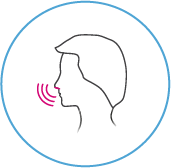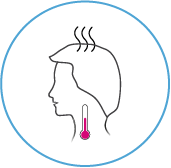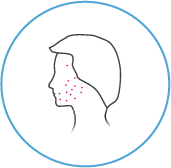Allergies and Cardiovascular Disease
According to new studies, 30 million people suffer from allergies in Germany alone. There are just under 20,000 various causes of allergies, with pollen (hay fever) being the most common trigger. Strong allergies are well known to weaken the immune system and the lungs. Few know, however, that allergies may also have a chronic impact on the heart and the cardiovascular system.
Which symptoms are triggered by allergies?
What is the connection between allergies and cardiovascular disease?
What are allergies?
The term „allergy” essentially indicates a foreign reaction, relating to the immune system’s defense reaction to unknown substances. Allergies can technically be triggered by any substance that is present in the environment and is normally harmless. For example, plants, animal products, food, metals, chemicals or poison from wasps or bees all have the potential to trigger an allergic response. Allergies are divided into three forms based upon how they trigger an allergy: via inhalation, contact or ingestion (food). Hay fever is an allergy of inhalation, as are dust and mold allergies.
In certain situations, the immune system reacts particularly strongly to a pathogen with symptoms of varying intensities, which can trigger an inflammatory process. These substances are known as allergens. It is important to identify the allergens in each individual situation to effectively treat the causative allergy and to prevent possible side effects.
How are allergies diagnosed?
Allergies are diagnosed by an allergist or by a specialist physician frequently working with allergies (i.e. pulmonologist, ENT, dermatologist, primary care physician). The so-called prick test, the intradermal test, and blood tests are possible methods of diagnosis. The prick and provocation tests are both skin tests which expose the body to certain allergens to test for a reaction. The prick test is performed on the underarm—the skin is pricked with a small amount of an allergen-containing solution. The intradermal test is similar, but it injects a small amount of the solution directly under the skin. If hypersensitivity to a certain allergen is present following a skin test, redness or wheals present in this location after approximately 20 minutes. With the help of blood tests, immunoglobulin-E antibodies (IgE antibodies) can be detected in the blood to help draw conclusions about the specific triggering allergen. This method is often implemented when testing young children.
What causes allergies?
The cause of allergies is faulty regulation and an excessive defense reaction of the immune system. When the body absorbs a foreign substance via the mucous membranes of the respiratory system, GI tract or the skin, the immune system determines if a pathogen is present and if a defense reaction should be initiated. Defense cells and antibodies are released by the immune system to fight against bacteria, viruses or parasites.
In certain situations, the immune system is unable to decipher which substances are problematic and which are harmless. With an allergy, the immune system creates specific antibodies when coming in contact with the allergen (i.e. pollen, mites, insect poison). The immune response starts with sensitization—when first coming in contact with an allergen, the immune system is stimulated and produces allergen-specific IgE antibodies, but an allergic reaction does not occur. However, the allergen is registered as an enemy. When the allergen is again contacted, the immune system reacts and symptoms occur.
Which symptoms are triggered by allergies?
Allergies can provoke symptoms that vary greatly from person to person, that are also often symptoms of other diseases (i.e. a cold). For this reason, the diagnosis of allergies can not be made strictly based upon the presence of symptoms, but with the help of allergy tests. The symptoms can vary as greatly as the allergens themselves:
The length of the reactions may be brief, may last minutes or hours, or may even last for up to days following the initiating event. In certain situations, this can lead to anaphylactic shock, which must be treated immediately. Anaphylactic shock is an acute pathologic reaction of the immune system that, in the worst case, can lead to a deadly malfunction of circulation. An anaphylactic reaction can lead to swelling of the larynx, therefore causing closure of the respiratory tract.
One of the most well-known allergies is hay fever. This is an allergic inflammation of the nasal mucosa (rhinitis), that can be triggered by pollen and is therefore also known as a pollen allergy. Signs of hay fever include watery eyes, a congested nose or difficulty breathing. This type of allergy occurs seasonally, particularly in the spring and summer months, but can also continue into fall.
How are allergies and cardiovascular disease connected?
With allergies that impact the airway, a chronic train reaction can be triggered. Allergies are a well-known trigger for asthma. When the mucous membranes are inflamed over a longer period of time, an allergy can also predispose one to bronchitis. Chronic lung disease may lead to Cor pulmonale, or right ventricular enlargement and failure, caused by lung disease.
Many assess shortness of breath and inflamed bronchi as harmless seasonal ailments, possibly due to a cold. However, it should be determined if an allergy is the cause and if therapeutic measures can be taken to prevent unnecessary burden on the heart and the immune system. In addition to pollen, other allergies can also affect the cardiovascular system. The combination of physical stress and a weakened immune system leads to a weakening of the heart muscle and can develop into a heart muscle inflammation.
Those affected should avoid contact with allergens, the substances that trigger allergies. To strengthen the heart, it is important to exercise frequently. Mild endurance sports should be performed in order to expand the bronchi and to improve the body’s oxygen supply, therefore strengthening the function of the heart. We have created a list of heart tips to help improve your quality of life during allergy season.












